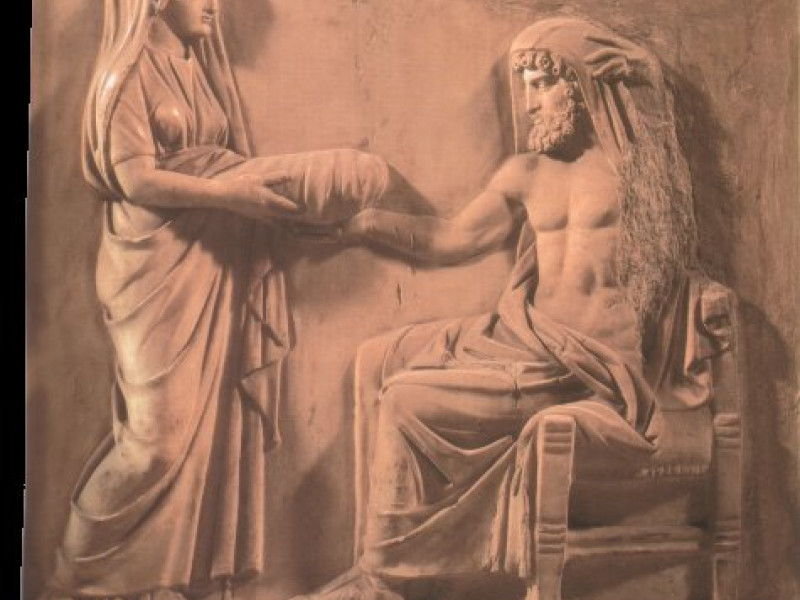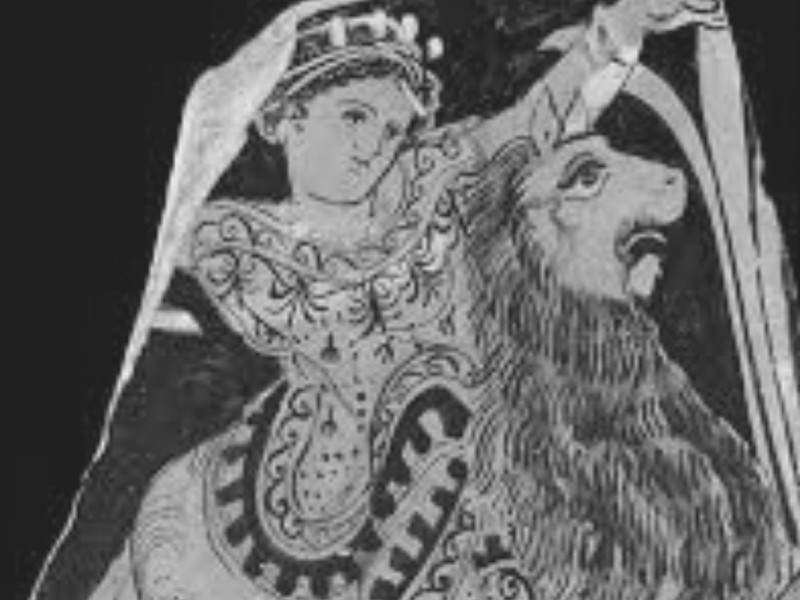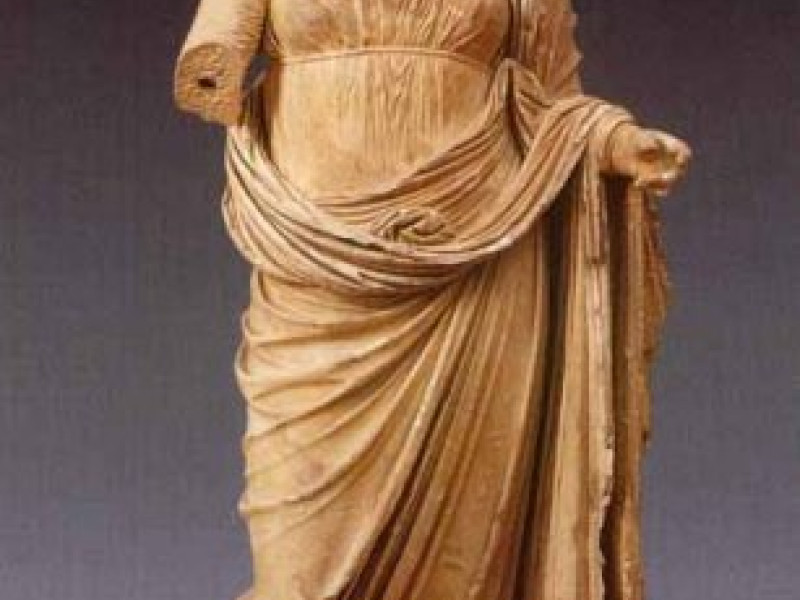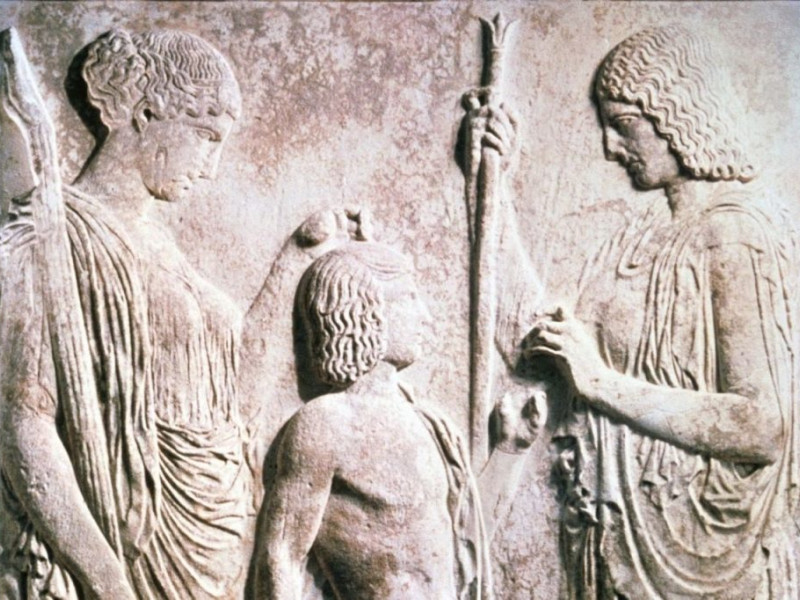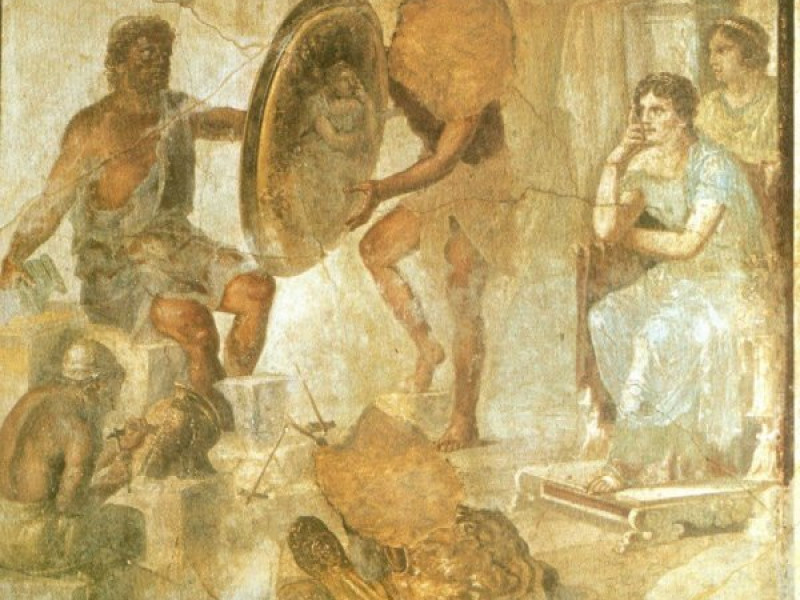Gaea and her Daughters
In Greek mythology, Gaea and her daughters – Rhea, Themis and Dione – were the earliest earth and mother goddesses. These goddesses played decisive roles in Hesiod's Theogony, where they made or removed rulers.
Gaea
Gaea (Γαἳα) was seen as the earth itself; there was no difference between the two. Her name was also spelt Ge and Gaia, but to the Romans she was known as Tellus or Terra. Gaea was not only the ultimate mother goddess; she was a creator goddess.
Gaea was born with Eros (Love) and Tartarus from Chaos (primeval abyss). They were the first physical matter to come into existence.
Through her womb sprang many gigantic and powerful children. Either without a male partner or by Aether, Gaea became the mother of Uranus (Heaven), Pontus (Sea) and Ourea (Mountains).
Through Uranus' marriage to his own mother, he became the supreme ruler of the universe. Gaea and her husband/son represented the separation of heaven and earth.
Gaea bore most of the children to Uranus. There were the Hundred-Handed (Hecatoncheires), the Cyclops, the Titans and the Gigantes or Giants. By her brother Tartarus, she bore the most powerful of her monstrous offspring, the Typhon.
Uranus fell because he angered his mother when he confined and hid their children, the Hundred-Handed and the Cyclops, under the depth of the Earth (Gaea). This caused her great pain. Gaea sought help from her son, Cronus, the youngest and bravest of the Titans. It was she who gave her son the sickle to emasculate her son/husband.
Cronus gained power and rulership over the universe, but he also enraged his mother when he refused to release his confined brethren. Gaea was gifted with divination, and she was said to be the first to hold the oracle of Delphi. So she foretold to her son Cronus that he would fall because of his son. Fearing that he would lose his power to his children, Cronus swallowed each child that his wife/sister Rhea bore to him. Gaea and Rhea helped Cronus' youngest son, Zeus, to overthrow Cronus and most of the other Titans.
Although Zeus released the Hundred-Handed and the Cyclops, most of the male Titans remained imprisoned in Tartarus. So Gaea turned against her grandson, encouraging her other children, the Gigantes and the Typhon, to fight against the Olympians. Yet, it was Gaea who foretold how the Gigantes could be defeated with the help of the mortal hero, Heracles.
One of Gaea's interesting roles was her divination. She was said to have been the first to hold the oracle at Delphi. She passed this responsibility to another daughter of hers, Themis. Themis was also said to be an earth goddess as well as the goddess of order and justice.
Gaea was a primeval goddess of the earth who could unleash power upon anyone foolish enough to anger her. She had the power to make or break a ruler. She was partly responsible for deposing her two sons (Uranus and Cronus), and almost succeeded against her grandson (Zeus).
Gaea also bore some children to her other son, Pontus, the personification of the sea. Gaea was the mother of Nereus, Phorcys, Eurybia, Thaumas and the sea monster Ceto.
She also bore the giant Antaeus to Poseidon. Antaeus usually challenged, wrestled with and killed travellers. Most of Antaeus' power came from his contact with the earth. Antaeus was virtually invincible until Heracles killed him.
By Hephaestus, Gaea was the mother of Erichthonius, when the semen of the smith god landed on the ground.
Rhea
Rhea (Ῥεία), or Ops or Magna Mater, was a mother goddess. She was sometimes identified with the Phrgyian mother goddess, Cybele.
Rhea was one of the Titans, the children of Gaea and Uranus. She was the sister of Cronus and when he became the supreme ruler of heaven and earth, he married her and she became his consort. However, the marriage was not a happy one.
When Gaea foretold that Cronus would be overthrown by one of his children, Cronus cannibalizingly swallowed each child that Rhea bore to her brother. Five successive infants were swallowed.
Fearing to lose all her children, Rhea hid her last child, a son named Zeus, in a cave of the mountain of Crete. She tricked her husband/brother by giving a stone wrapped in swaddling cloth, tricking him into swallowing the stone. With the help of his mother and grandmother, Zeus had Cronus spew out his brothers and sisters. Eventually Zeus and his brothers defeated Cronus and most of the male Titans, confining them in Tartarus.
Rhea was responsible for the reconciliation between her children, Zeus and Demeter, giving assurance that Persephone would spend two-thirds of a year with her mother Demeter, and only one third with her husband Hades in Erebus (Underworld). See Demeter and Persephone about the myth of Demeter.
Themis
Themis (Θέμις) was also a Titaness and the daughter of Gaea. Themis was originally an earth goddess before she became the goddess of order and justice.
Themis was the second wife of Zeus, and bore daughters to him. She was the mother of three goddesses known as Horae or the Seasons. She was possibly the mother of Moerae or Fates.
According to Aeschylus and a few other authors, Themis was the mother of the Titan Prometheus by her brother Iapetus.
As an earth goddess, she was sometimes indistinguishable from her mother (Gaea). Like her mother, Themis also possessed the ability of divination and held the oracle of Delphi, which her mother gave to her.
It was Themis who told Deucalion, son of Prometheus, how he might repopulate the Earth, after the Deluge. She instructed Deucalion and Pyrrha to pick up the rocks from ground and throw the stones backward, over their shoulders. Where the rocks landed, people would spring out of the ground.
It was Themis who foretold that any son that the sea goddess Thetis bore would become greater and stronger than the father. Thetis only told this prophecy to Prometheus. Prometheus refused to disclose this to Zeus, which was a great bargaining chip. Prometheus was punished for revealing how to make fire to mankind. Prometheus only told this prophecy to Zeus after Heracles released him from being chained to the highest peak of the Caucasian Mountains. Zeus, fearing that he would be deposed by his own son, hastily married Thetis to a mortal hero, Peleus. Thetis became the mother of Achilles.
Clearly, Themis' prophecy was involved with Prometheus, which benefited Prometheus either directly or indirectly, thereby helping mankind.
Themis would later relinquish the oracle to Apollo, when the young god came of age. Most myths indicated that Apollo won the oracle when he slew the dragon or serpent Python.
As the goddess of order, she also represented the divine justice. She not only represented justice on heaven and earth. Justice was also meted out in the Underworld. In Hades' domain, three men served Themis as her attendants and judges in the Underworld: Aeacus son of Zeus and Aegina, Minos and Rhadamanthys sons of Zeus and Europa. They were responsible for judging each mortal who had died, whether they are to be rewarded or punished in their afterlife.
Dione
I should perhaps also mention Dione (Διώνη). According to Homer, Dione was the mother of Aphrodite, who comforted the love goddess when Diomedes wounded her daughter in Troy.
Homer didn't mention Dione's own parents, but Hesiod had called her the daughter of Oceanus and Tethys. However, other authors, including Apollodorus and Hyginus, said that Dione was a Titaness, and thus she was a daughter of Uranus and Gaea.
Dione's attributes are rather obscure, but she was probably a mother goddess. Some believed that Dione was a moon or water goddess.
Usually, Hera was seen as Zeus' wife and consort, but according to the Linear B tablets, Dione's name is a feminine counterpart of Zeus. This suggests that Dione was originally Zeus' consort before Hera replaced Dione, when the Hellenic Greeks began suppressing the mother goddess.
Related Information
Name
Gaea, Gaia, Ge, Γαἳα (Greek).
Tellus, Terra, Terra Mater (Roman).
Rhea, Ῥεία (Greek).
Ops, Magna Mater (Roman).
Themis, Θέμις – "Order".
Dione, Διώνη.
Sources
Theogony and Works and Days were written by Hesiod.
Library was written by Apollodorus.
By Jimmy Joe
